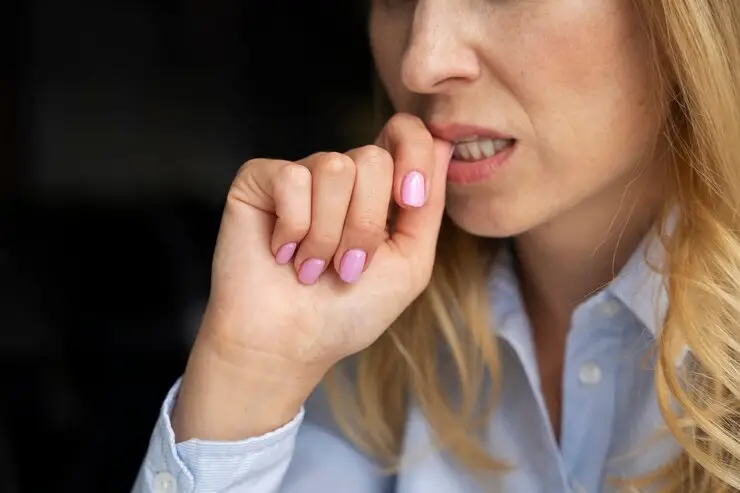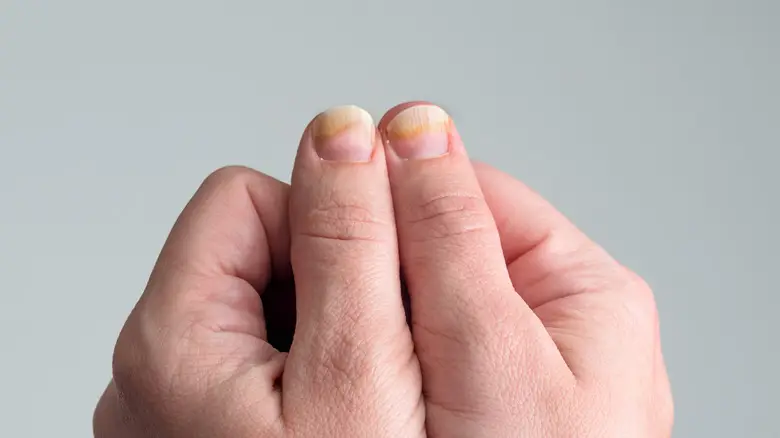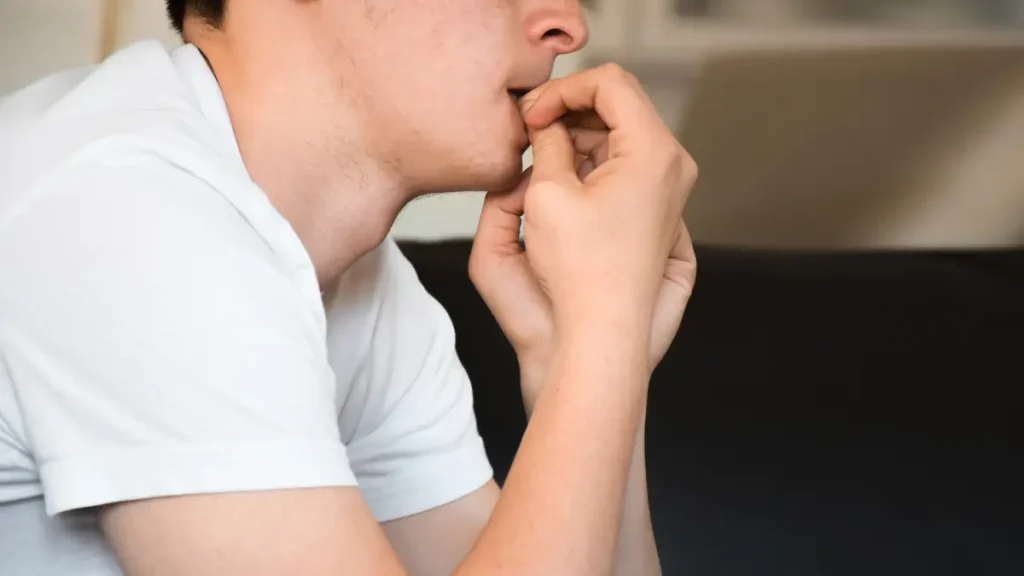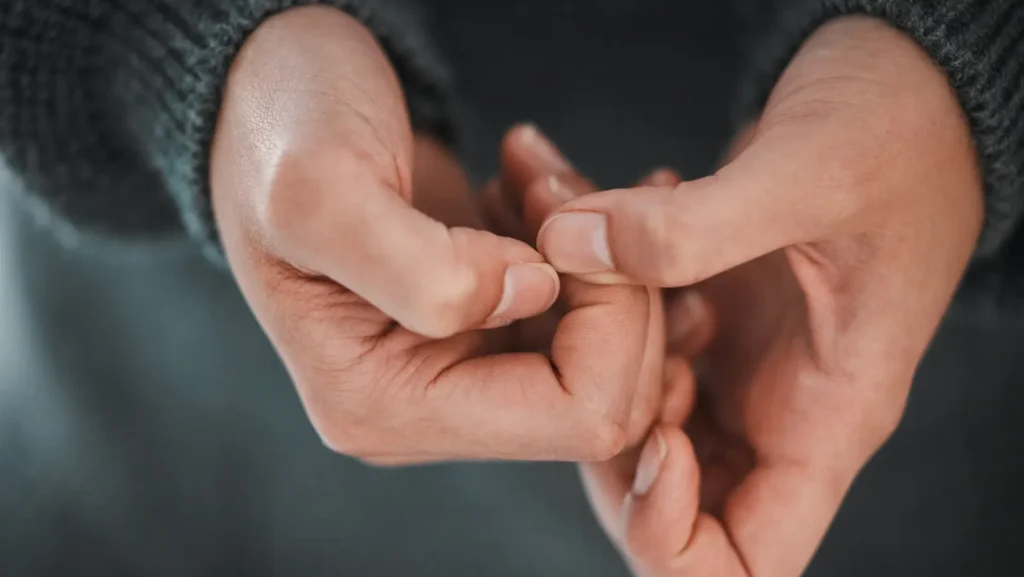Have you ever caught yourself biting your nails during a stressful moment or while simply sitting idle? It’s such a common habit that most of us don’t even think twice about it. But have you ever wondered if there’s more to it than just nerves or boredom? Could it be connected to something deeper, like OCD (Obsessive-Compulsive Disorder)?
In this blog, we’re diving into the fascinating (and maybe surprising!) connection between nail biting and OCD. We’ll explore questions like: Why do people bite their nails? Is it always just a bad habit? How do you know if it’s linked to OCD? And most importantly, how can you stop if it’s getting out of hand?
Contents
- 1 What Psychology Says About Nail Biting?
- 2 Is Nail Biting Harmful to Mental and Physical Health?
- 3 How Is Nail Biting Connected to OCD?
- 4 Can Nail Biting Become a Compulsion?
- 5 Is Nail Biting Always a Sign of OCD?
- 6 What Are Effective Ways to Stop Nail Biting?
- 7 Can Treatment for OCD Reduce Nail Biting?
- 8 Get Free Online Help for OCD
What Psychology Says About Nail Biting?

Nail biting isn’t just a random habit—it actually has a lot to do with our psychology. Experts suggest it’s often a way to cope with stress, boredom, or even perfectionism. For some, it feels like a comforting action during anxious moments, while for others, it’s an automatic response they barely notice.
Psychologists classify “nail-biting as a body-focused repetitive behavior (BFRB)“, which means it’s something people do without thinking to relieve tension or frustration.
The key takeaway? Nail biting is more than just a surface-level habit. Psychology shows it’s deeply tied to how we manage emotions, stress, and even our thought patterns. If it feels like you can’t stop biting your nails no matter how hard you try, it might be worth looking into the emotional or mental triggers behind it.
Is Nail Biting Harmful to Mental and Physical Health?
At first glance, nail biting might seem like a harmless habit, but it can take a toll on both your mental and physical health over time. Let’s break it down:
The Physical Impact

Constantly biting your nails can damage the skin around them, leaving you prone to infections. Cuts or sores near your nails make it easy for bacteria and germs to enter your body, causing redness, swelling, or even more severe issues like paronychia (a painful infection).
Not to mention, chewing on your nails can harm your teeth too. Over time, it may cause chipped teeth, jaw strain, or even gum problems. And don’t forget—our hands touch all kinds of dirty surfaces, so putting your fingers in your mouth increases your exposure to germs and illnesses.
The Mental Impact
Mentally, nail biting can be just as damaging. Many people feel embarrassed or ashamed of their chewed-up nails, which can hurt their self-esteem. You might find yourself hiding your hands or feeling judged, which can add unnecessary stress to social situations.
If nail biting is tied to anxiety or OCD, it can worsen these conditions. The act of biting might provide temporary relief, but the cycle of shame and frustration afterward often creates more emotional distress.
So, Is It Harmful?
Absolutely! While it might seem like a small issue, nail biting can snowball into bigger problems for your mental and physical well-being. If it’s affecting your life or health, it’s worth finding ways to address the habit before it gets out of hand.
How Is Nail Biting Connected to OCD?

Understanding the Connection
OCD is a mental health condition characterized by intrusive thoughts (obsessions) and repetitive actions (compulsions) performed to reduce anxiety. For some people, nail biting functions as a compulsion—a repetitive behavior that offers temporary relief from stress or distressing thoughts.
While not everyone who bites their nails has OCD, the habit shares similarities with the compulsive behaviors seen in the disorder. In both cases, the individual feels a sense of urgency or lack of control, leading to repetitive actions to ease mental discomfort.
Thinking if your nail-biting habit is more than just a quirk? Well, it could be tied to something deeper, like OCD or anxiety.
This 2-minute quiz is designed to help you understand if your nail biting might be connected to obsessive-compulsive tendencies. Click the button below and find out!
Can Nail Biting Become a Compulsion?
Yes, nail biting can evolve into a compulsion, especially when it feels uncontrollable. If you find yourself biting your nails whenever you’re anxious, stressed, or even just bored, it might be your brain’s way of seeking relief.
However, compulsive nail biting isn’t just about the action—it’s about how it’s tied to your emotional state. For example:
- You feel anxious before a meeting, so you bite your nails to calm down.
- You feel relief afterward but notice guilt or frustration because you’ve hurt your fingers again.
This cycle of tension, relief, and regret mirrors how compulsions work in OCD. Over time, nail biting can become an automatic response to emotional triggers, making it harder to stop.
Is Nail Biting Always a Sign of OCD?
No, not at all. Nail biting can be a standalone habit caused by boredom, genetics, or learned behavior from childhood. Many people bite their nails without any connection to OCD or other mental health conditions.
However, if the habit is linked to:
- Intrusive thoughts that drive you to bite your nails,
- Feelings of distress when you try to stop, or
- Other compulsive behaviors (e.g., skin picking, hair pulling),
it might be worth exploring whether OCD or a similar condition is a factor.
What Are Effective Ways to Stop Nail Biting?

Breaking the nail-biting habit can be challenging, especially if it’s been with you for years. But don’t worry—there are plenty of effective and easy strategies to help you quit. Let’s dive in!
1. Identify Your Triggers
- Ask yourself: When do I bite my nails?
- Is it when you’re stressed, bored, or deep in thought?
- Keep a journal or mental note of these moments to understand what triggers your habit. Knowing the “why” helps you tackle the “how.”
2. Keep Your Nails Short and Clean
- Trim your nails regularly to reduce the temptation to bite.
- Clean, well-groomed nails are harder to nibble on and less likely to cause damage.
- Plus, healthy-looking nails might make you think twice before biting.
3. Use Bitter-Tasting Nail Polishes
- Apply nail polishes designed to taste bitter and unpleasant.
- Every time you try to bite, the taste will act as an instant deterrent.
- These polishes are widely available and super easy to use.
4. Find Healthy Substitutes
- Replace nail biting with healthier habits, like:
- Squeezing a stress ball.
- Chewing sugar-free gum.
- Fidgeting with a pen or small object.
- Keeping your hands busy can stop the urge in its tracks.
5. Practice Mindfulness and Stress Management
- Nail biting is often tied to stress or anxiety. Try these alternatives:
- Deep breathing exercises.
- Meditation or mindfulness apps.
- Yoga or light stretching to calm your nerves.
- Over time, these practices can reduce the need for biting as a stress reliever.
6. Seek Professional Help
- If nail biting feels uncontrollable or linked to deeper issues like OCD or anxiety, don’t hesitate to consult a professional.
- Therapies like:
- Cognitive-Behavioral Therapy (CBT) can address the underlying causes.
- Habit Reversal Training (HRT) helps replace the habit with healthier alternatives.
Can Treatment for OCD Reduce Nail Biting?
If your nail-biting habit is connected to OCD, addressing the underlying disorder can significantly help reduce or even eliminate the behavior. OCD is often marked by intrusive thoughts and repetitive actions (compulsions) that provide temporary relief from anxiety. For some, nail biting becomes one of these compulsive actions. Treating OCD can help break this cycle and create healthier coping mechanisms.
- Some of the most effective treatments for OCD is Cognitive-Behavioral Therapy (CBT) and Exposure nd Response Prevention (ERP).
- In some cases, medication may also play a role. Selective serotonin reuptake inhibitors (SSRIs) are commonly prescribed to manage OCD symptoms.
- Another effective approach is Habit Reversal Training (HRT), a behavioral therapy designed specifically to address habits like nail biting.
When OCD is treated holistically, the behaviors tied to it—like nail biting—often decrease. However, the effectiveness of treatment depends on various factors, such as the severity of the OCD, commitment to therapy, and addressing co-existing stressors.
Get Free Online Help for OCD
Dealing with overwhelming compulsions like nail biting, or struggling with intrusive thoughts, can feel isolating and exhausting. If these habits have taken over your life, it’s time to talk to someone who truly understands. My Mind Mantra is here for you!
We offer a safe and supportive space where compassionate listeners are dedicated to hearing you out and helping you manage your feelings. Sometimes, just being heard can make all the difference. Download our app and TALK TO A LISTENER today!
If you need professional guidance, Mantra Care provides the best online support for people dealing with OCD and other mental health challenges. With expert therapists and counselors by your side, you’ll get the tools and techniques you need to break free from compulsions and feel in control again.
This is your chance to take the first step toward feeling better. Don’t wait—Book Your Trial Therapy Online Session Today and start your journey to a healthier, happier you. You deserve this!
